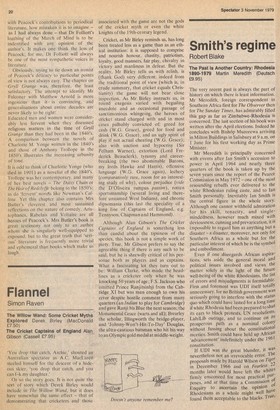Flannel
Simon Raven
The Willow Wand: Some Cricket Myths Explored Derek Birley (MacDonald £7.50) The Cricket Captains of England Alan Gibson (Cassell £7.95) 'You drop t hat catch, Archie,' shouted an Australian spectator as A.C. MacLaren steeled • himself for the descent of a hideous skier, 'you drop that catch, and you can f—k my daughter.'
Or so the story goes. It is not quite the sort of story which Derek Birley would include in The Willow Wand, but it does have somewhat the same effect — that of demonstrating that cricketers and those associated with the game are not the gods of the cricket myth or even the white knights of the 19th-century legend.
Cricket, as Mr Birley reminds us, has long been treated less as a game than as an ethical institution: it is supposed to comprise and nourish honour, chastity, patriotism, loyalty, good manners, fair play, chivalry in victory and manliness in defeat. But the reality, Mr Birley tells us with relish, is (thank God) very different: indeed from the traditional point of view (which is, in crude summary, that cricket equals Christianity) the game will not bear close inspection. As Mr Birley instructs us, in round exegesis varied with beguiling anecdote and an occasional passage of sanctimonious whingeing, the heroes of cricket stand charged with and in most cases palbably convicted of: greed for cash (W.G. Grace), greed for food and drink (W.G. Grace), and an ugly spirit of play if not actual cheating (W.G. Grace); also with unction and hypocrisy (Sir Pelham Warner), extortion (Lord Frederick Beauclerk), tyranny and careerbreaking (the two abominable Barons, my lords Hawke and Harris), offensive language (W.G. Grace again), lechery (comparatively rare, room for an interesting study of why), colour prejudice (vide the D'Oliveira rumpus passim), rotten sportsmanship (several living and therefore unnamed West Indians), and chronic dipsomania (this last the speciality of a long line of Captains of England, e.g. Tennyson, Chapman and Hammond).
Although Alan Gibson's The Cricket Captains of England is something less than candid about the tipsiness of the species, this book is not a simple work of piety. True, Mr Gibson prefers to say the agreeable thing if there is any such to be said, but he is shrewdly critical of his personae both as players and as captains. What a fascinating lot they turn out to be: William Clarke, who made the headlines as a cricketer only when he was knocking 50 years of age; F.S. Jackson who omitted Prince Ranjitsinhji from the Cabridge XI but was man enough to own his error despite hostile comment from many quarters (an Indian to play for Cambridge) and gave Ranji his Blue the next season; the Monumental Grace (warts and all); Brearley the scholar, Illingworth the bridge-player, and 'Johnny-Won't-Hit-To-Day' Douglas, the ultra-cautious batsman who hit his way to an Olympic gold medal at middle-weight.


































 Previous page
Previous page